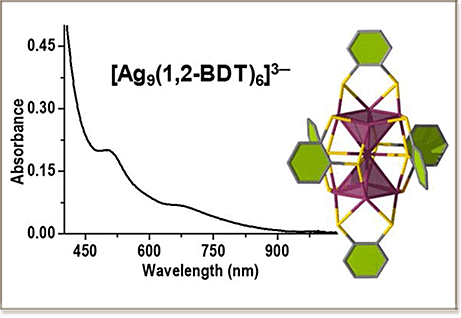

The emerging promise of few-atom metal catalysts has driven the need for developing metal nanoclusters (NCs) with ultrasmall core size. However, the preparation of metal NCs with single-digit metallic atoms and atomic precision is a major challenge for materials chemists, particularly for Ag, where the structure of such NCs remains unknown. In this study, we developed a shape-controlled synthesis strategy based on an isomeric dithiol ligand to yield the smallest crystallized Ag NC to date: [Ag9(1,2-BDT)6]3– (1,2-BDT = 1,2-benzenedithiolate). The NC’s crystal structure reveals the self-assembly of two Ag square pyramids through preferential pyramidal vertex sharing of a single metallic Ag atom, while all other Ag atoms are incorporated in a motif with thiolate ligands, resulting in an elongated body-centered Ag9 skeleton. Steric hindrance and arrangement of the dithiolated ligands on the surface favor the formation of an anisotropic shape. Time-dependent density functional theory based calculations reproduce the experimental optical absorption features and identify the molecular orbitals responsible for the electronic transitions. Our findings will open new avenues for the design of novel single-digit metal NCs with directional self-assembled building blocks.
